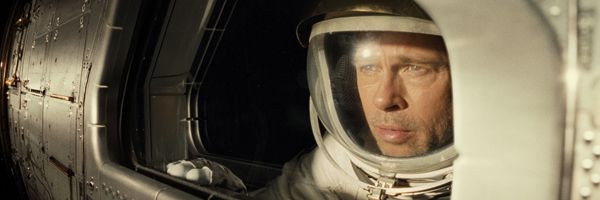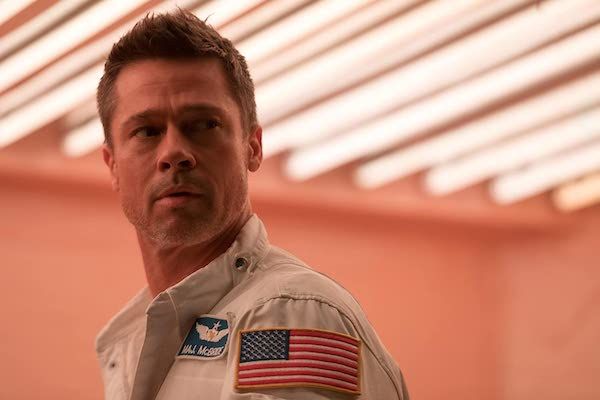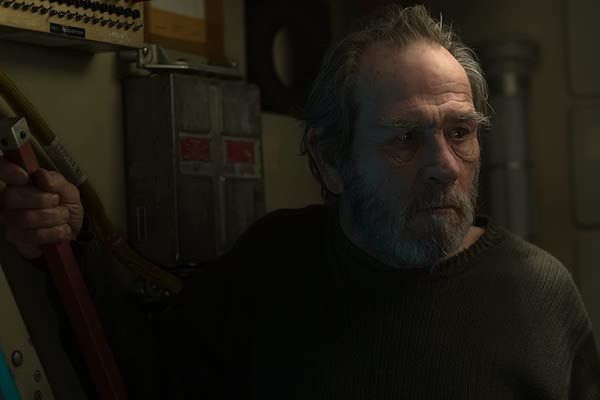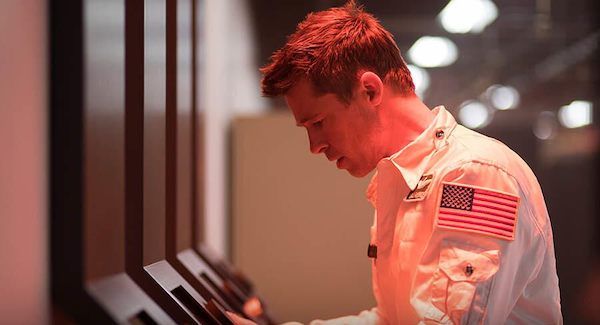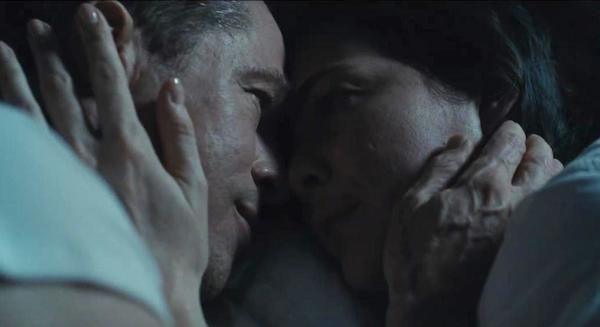"What happened to my dad? What did he find out there? Did it break him? Or was he always broken?"
Were he alive today, Sigmund Freud would have had a field day analyzing Ad Astra. But, alas, that cool brain guy has passed on and you're stuck with me, someone who is decidedly not a bespectacled and learned Austrian, but does love to analyze things. And when it comes to director James Gray's contemplative 2019 sci-fi flick Ad Astra, which stars Brad Pitt, Tommy Lee Jones, Ruth Negga, Donald Sutherland, and Liv Tyler, there is plenty to analyze — including that bonkers ending.
A majority of Ad Astra's runtime is dedicated to Pitt's character, Roy McBride, attempting to fulfill the task set forth by the United States Space Command (SpaceCom): Send a message to the edge of the Milky Way galaxy in an attempt to encourage his father, Clifford McBride (Jones), to come home. Clifford left Roy when Roy 29 years before the start of the movie in order to head the Lima Project, an endeavor dedicated to finding proof of the existence of alien life. All communication between Earth and the Lima Project, whose crew posted up near Neptune in order to do their researchin', ended 16 years into the mission. When SpaceCom is led to believe Clifford might be alive (and probably not doing so hot after nearly 30 years living in the vastness of space), they recruit Roy, who has chosen to follow in his father's footsteps and become a model astronaut, to essentially serve as bait to get Papa McBride to return to Earth.
So, what actually happens at the end of Ad Astra? Numerous failed attempts to send a message via laser (yes, really) from a base on Mars cause Roy to crack. The calm, cool, collected façade which has shielded him from confronting any real emotions through his life begins to crack as the impassioned, pathos-driven pleas he sends out to his father seemingly go unanswered. While struggling to understand why he isn't good enough to warrant some response from his father, Roy is visited by Helen Lantos (Negga). Helen was born on Mars and is the child of two Lima Project scientists. She breaks the awful truth to Roy: The Lima Project's search for alien life didn't yield the desired result in an expected window of time, leading to restlessness from the crew, who wanted to return home. Clifford, dead-set on proving intelligent, non-human life was out there and, as it is implied, driven to the fringes of sanity by the possibility no such life exists, reveals he locked all other Lima Project team members in one corridor of their space station and opened the airlock, effectively killing them. This shocking message is shared in a video message sent to SpaceCom years ago which Helen has managed to obtain.
Roy is finally forced to confront the awful truth that his father is way more disappointing than he was led to believe. But, because Roy is only human, he remains convinced he can bring his father back to Earth and they can sort through their issues on terra firma. Roy makes his way to the Lima Project space station and finds Clifford in a shaggier, moodier state than Helen's video message. Clifford has completely retreated into his own mind, far more comfortable looking to the stars (ahem, don't you mean "ad astra," Allie?) and the possibilities that await and giving up on humanity altogether. This includes forsaking Roy, the son he barely knew, and coldly demanding to be left to his mission in peace. Heartbroken, Roy gathers his wits and copies all data from the Lima Project archives. He also arms the space station with a nuclear payload because, as we learn throughout in the movie, a massive electrical called The Surge threatens all life on Earth and it's believed the Lima Project station is the cause of it. So, buh-bye, space station. Roy also manages to tether Clifford to him in an effort to get them both back onto Roy's ship, but Clifford begs Roy to untether him and let him drift out into the dark unknown, his true home, and Roy acquiesces. Once home, Roy embraces the Lima Project's ultimate conclusion that humans are, in fact, the only intelligent life in the known universe and begins embracing his human side by attempting to reconnect with his estranged wife (Liv Tyler).
"I don't know if I hope to find him or finally be free of him."
After that absolute laugh-riot of a third act, it's hard to believe there is something meaningful to be gleaned, but there is actually something meaningful to be gleaned. Largely because he is played by Pitt, Roy McBride makes daddy issues extremely watchable. But in Roy's struggle to work through the impact of Clifford's absence and the kind of man Roy has become as he pursued praised from a man who he has little connection with, we can find a smaller-scale examination of humanity's relationship to history, the myths were are taught about "great men" like Clifford, and why it just might be better to focus on the here and now, where your loved ones life.
Throughout Ad Astra, Roy grapples with his own sense of self as as he travels through space to get to his father. This is a man who has painstakingly molded himself in the image of the absent father he has valorized for no particular reason other than the vague belief Clifford is a #GreatMan. We come to understand Roy's quest for greatness — a quest modeled after Clifford's work which ostensibly is modeled after the men who went before him in search of greatness out in the cosmos — comes at the expense of any true human connection. But, on some level, Roy serves as an audience surrogate and it is through him we come to realize Roy has, be it consciously or subconsciously done, clung to those legends of men who sacrificed everything in pursuit of progress, discovery, and furthering the human race so it may be the best possible version it can be. That's not to say Roy is ignorant; on the contrary, ya boy McBride is one smart cookie. But, as my pal Freud would tell you, those daddy issues have a way of blinding a man, making him focus on, er, the wrong things in life.
The stark realization that Clifford doesn't actually live up to the myths Roy has made of him and his dangerous, "I truly don't give a shit" attitude about humanity in pursuit of everlasting glory is clearly telegraphed in Ad Astra's third act. After being bathed in the dreamy, fiery glow of various space craft, extraterrestrial bases, and even the various stunning atmospheres of space — all of which light Roy during moments of great meditation on his relationship to his father, humanity, and the universe — the hero astronaut is plunged into the sickly stark lighting of the Lima Project space station. In this light, Roy is forced to confront Clifford with the kind of cold brutality that makes for a harrowing reunion. This final conversation between father and son serves as a microcosm of the various conversations we as a society have been having, to varying degrees, throughout history and, more recently, on a very public and widespread scale.
What do we do when we realize the men who came long before us, whose exploits we've been taught to see as good for everyone but, in reality, have only served a select group, are revealed to be less-than-stellar human beings? How do we forgive ourselves for idolizing these men? How do we disentangle our own search for greatness from the prescribed path they set down which we've been told we must embrace? We must write our own stories and we must lead with love, not blind ambition. To dispose of true human connection, Ad Astra argues, is to dispose of anything binding you to the gifts of this reality and you're only left with madness pretending to be the greatness you seek.
Now, I'm not sure if Gray, who co-wrote as well as directed Ad Astra, actually meant for all of this meaning to come through in his seventh feature film. Was there really an intention for Roy and Clifford to serve as humanity vs. the ingrained myths of history, their fractured relationship and the results after meeting amidst great cosmic transformation meant to signal to us viewers that we must actually embrace each other if we are all that exists? I don't know. But Gray is on record in an in-depth conversation with Vulture from September 2019 revealing, in part, what he believes is one of the big takeaways of the movie. On Jones' Clifford McBride, he shares,
"If you were searching for something your whole life and you finally found it, what does that mean? That’s its own trouble, isn’t it? The movie is ultimately about the search, and how you dedicate your life to the idea of a goal. It’s the same way with filmmaking. You find pleasure in the doing. [...] I think the tragedy of Tommy Lee’s character is that he never found a pleasure in the beauties that he discovered. He never found beauty in the idea that human beings are what matter. The idea of striving is what matters."
And long before I spat out my thoughts on Ad Astra's ending on this here page, Gray was saying similar things at the time of the movie's release (via GamesRadar); the beauty of life, the progression of humanity, and the quest for greatness not seen or achieved through some big, paradigm shifting act. We achieve it through small, everyday acts of love and understand. And that notion of striving, as Gray illustrated Vulture through Clifford McBride's quest, is at the heart of it all.
Ad Astra is now available on HBO Max, or you can rent/buy through various retailers.

